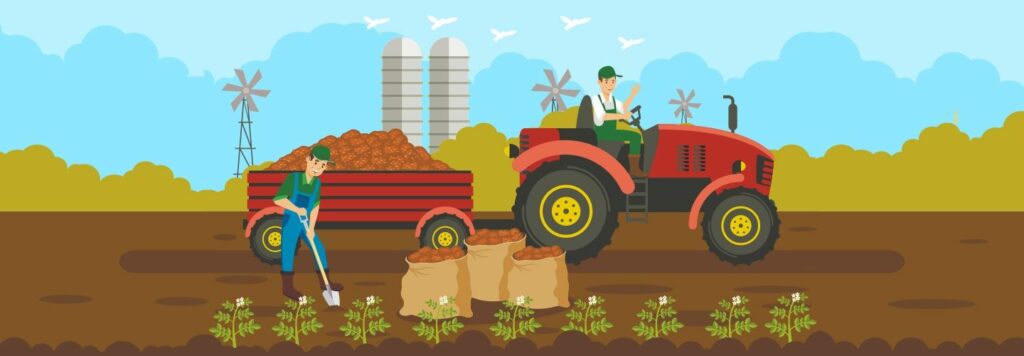Latest Trends Navigating Agriculture Supply Chains towards a More Sustainable Future

The phenomenal advancements in digital technologies have revolutionised agriculture supply chains in recent years. The advent of innovative tools and technologies is accelerating the pace of transformation for the agriculture industry. Although it is still in the early phases, these advancements are presenting exciting new opportunities for the agriculture sector and demonstrating strong potential in tackling global food production challenges, thereby igniting the hope for a more sustainable farming future.
As the world population is projected to grow to a staggering 9.8 billion by 2050, the need for implementing sustainable agriculture practices is rising rapidly. Hence, FarmERP has stepped up to improve the production capabilities of farmers with efficient technologies like mobile farming and biotech. 5G and agritech are also proving to be quite efficient in encouraging farmers to streamline their farming activities. Thus, in today’s transforming agriculture scenario, FarmERP is playing a key role in paving the way for a sustainable future for agriculture and farming. Following are the latest trends that are significantly transforming the agriculture supply chains and bringing more efficiency and sustainability into the farming practices.
Advancements in Biotech Enhancing Food Production Capabilities of Farmers
As the world grapples with climate change problems and a global pandemic, meeting the food production demands of an ever-growing population is turning out to be one of the biggest challenges the world has ever faced. However, with researchers across the world putting forward biotechnology as one of the potential tools for increasing food production, the hope for making agriculture more sustainable is still alive.
The effective use of advanced biotech tools is ensuring increased yields for crops along with improved shelf-life. Also, with biotech crops, farmers’ losses associated with extreme weather events have reduced considerably. This way, the adoption of various biotechnologies and genetic modifications like gene editing is not only boosting the production capabilities of farmers but also enhancing their incomes quite significantly.
5G Technology Set to Revolutionize Farming and Agriculture
5G technology today has the potential to bring about a transformative effect on the global economy by effectively revolutionizing various industry verticals. But one industry that will benefit immensely amongst all the industries is the farming industry. From monitoring on-field conditions and tracking livestock to assisting self-driving tractors and agricultural drones, the advent of superfast 5G mobile networks will play a crucial role in streamlining and optimizing various farming activities.
While AI has significantly enhanced the data collection practices of agribusinesses, 5G will further help in improving connectivity and improving the speed of operations. Autonomous drone sprayers equipped with a weed scanner and crop sprayer are empowering farmers to allocate their time more efficiently. Also, effective monitoring of weed and crops along with insect tracking is making the farming practices more precise. This way, as connectivity in smart farming is essential, 5G in agriculture is inevitable.
Mobile Farming Boosting Agricultural Productivity Like Never Before
Modern agriculture faces numerous challenges including soil degradation, lack of resources, excessive water consumption, etc. From soil to climate, farmers today need to continuously keep track of various farming environment factors to ensure optimal crop health. Mobile farming is making this possible by enabling farmers to navigate fields, calculate fertilizer-chemical blends, track rainfall measurements, etc through their smartphones.
The mobile technology-enabled system provides farmers with sustainable, effective solutions to overcome a variety of agricultural problems. Along with enhancing the planting, cultivating and harvesting efforts, mobile farming is also empowering farmers to promote and market themselves and sell their harvests effectively. By enabling farmers to carry out farming operations even when they are away from their fields, smartphones are turning out to be one of the most critical farming tools in today’s digital age. This way, with improved visibility and connectivity, mobile farming is significantly improving operational efficiencies and enhancing the agricultural productivity of farmers like never before.
How Agritech is Encouraging Smallholders to Carve their Way through Challenges
Smallholder farmers are a critical element of food value chains globally. Every year, they are faced with innumerable challenges that range from inadequate rainfall to volatile prices. The disintegration of smallholders from global value chains and their disconnect with the latest tools and technologies are also some of the major concerns. Similarly, the outbreak of COVID-19 pandemic and the resulting lockdown has further intensified the woes of small farmers.
In these testing times, agritech players are providing small farmers with efficient solutions to optimize their farming activities and grow healthier produce. FarmERP’s contract farming module is empowering more and more smallholders to get involved in contract farming arrangements. This is further enabling them with access to the latest tools and technologies to significantly enhance their processes and ensure improved outcomes.
Tackling the Labour Shortage Challenges with Efficient Agricultural Tools
The outbreak of the coronavirus pandemic earlier this year posed some serious threats to the agricultural industry. A major impact that it caused was the acute scarcity of labour due to the lockdown and social distancing restrictions, leaving the farmers scrambling for harvesting machines. Especially in India, it not only delayed the harvest of winter-crops but also had an impact on the plantation of next crops, thereby severely affecting the nation’s agriculture sector.
As farmers struggle to cope with workforce shortages, leveraging efficient agricultural tools has become essential for them to address the labour shortage and farm production concerns. Greater adoption of digital tools like drones, genomics, AI platforms, etc are helping farmers to significantly improve their operational efficiencies and drive better results. This way, advancements and innovation in agricultural tools are helping farmers to effectively cope with workforce shortages and bringing greater value to the agricultural industry.
Government-led Initiatives to Support Farmers in Crisis Situations
The outbreak of the COVID-19 pandemic has been a major wake-up call for government institutions and industries across the world. The struggles of the farmers across the world have intensified immensely with no strong emergency preparedness plans in place. Even though government subsidies are providing some respite for the farmers, they are still far away from ending the woes of farmers.
Government initiatives can play a huge role in making the agriculture sector more powerful and resilient by streamlining the technology integration efforts of farmers. Thus, having efficient emergency crisis plans and farmer-centric reforms could effectively bolster the agriculture sector’s capability to deal with uncertain events and encourage marginal farmers to move from subsistence farming to market-oriented commercial farming.
Satisfying Every Aspect of Agriculture to Achieve Sustainability
Advancements in biotech and mobile farming are helping this cause by improving the food production capabilities of farmers globally. Similarly, 5G on-farm machinery and other agritech tools are decreasing the dependence of farmers on labourers and bringing revolutionary changes in farming activities.
Various government reforms are enhancing the emergency preparedness efforts of the agriculture industry to guide farmers in the right direction during crisis situations. Agritech players like FarmERP are enabling small farmers to use efficient tools and technology and effectively streamline their agricultural activities. This way, by enhancing operations, upgrading tools & technologies and ensuring the overall development of farms, the agriculture industry can move towards a more sustainable and bright future.
